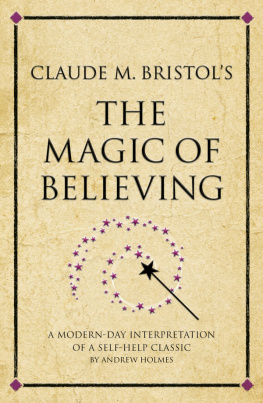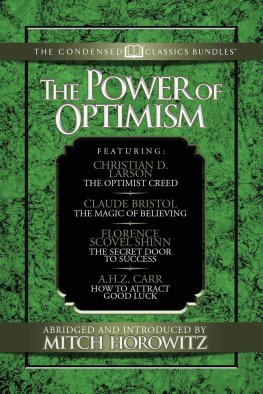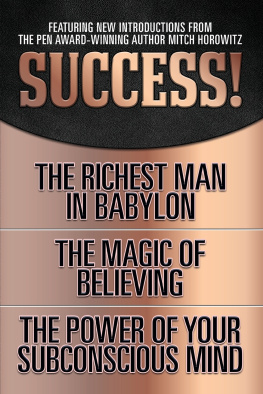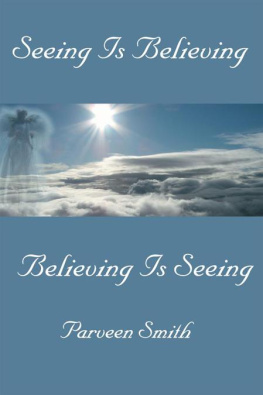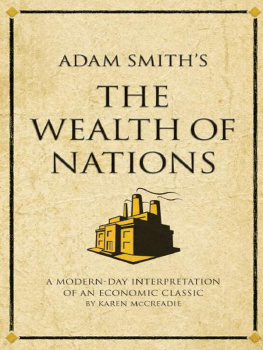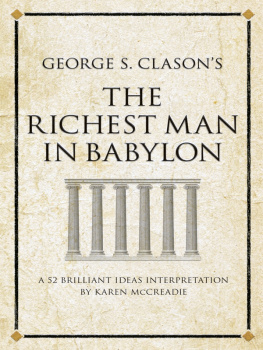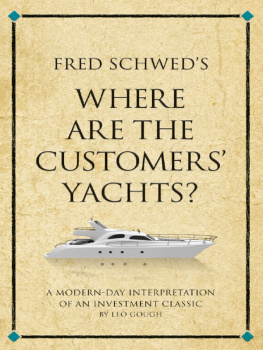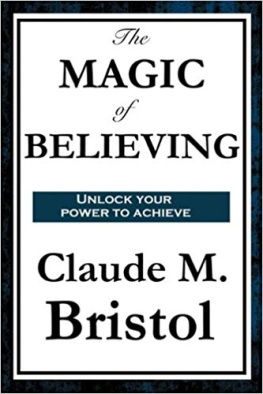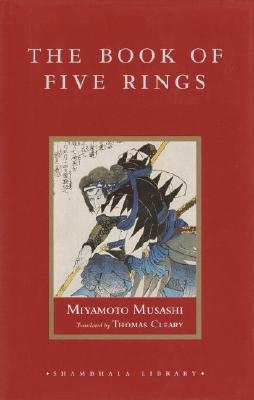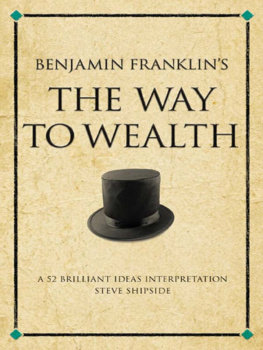CLAUDE M. BRISTOLS
THE
MAGIC OF
BELIEVING

A MODERN-DAY INTERPRETATION
OF A SELF-HELP CLASSIC
BY ANDREW HOLMES
Copyright Infinite Ideas Limited, 2013
First published in 2013 by
Infinite Ideas Limited
36 St Giles
Oxford
OX1 3LD
United Kingdom
www.infideas.com
All rights reserved. Except for the quotation of small passages for the purposes of criticism or review, no part of this publication may be reproduced, stored in a retrieval system or transmitted in any form or by any means, electronic, mechanical, photocopying, recording, scanning or otherwise, except under the terms of the Copyright, Designs and Patents Act 1988 or under the terms of a licence issued by the Copyright Licensing Agency Ltd, 90 Tottenham Court Road, London W1T 4LP, U.K., without the permission in writing of the publisher. Requests to the publisher should be addressed to the Permissions Department, Infinite Ideas Limited, 36 St Giles, Oxford, OX1 3LD, U.K., or faxed to +44 (0) 1865 514777.
A CIP catalogue record for this book is available from the British Library.
ISBN 9781906821326
Brand and product names are trademarks or registered trademarks of their respective owners.
INTRODUCTION

The Magic of Believing was no quick fix, but it was ahead of its time.
When Claude Bristol wrote The Magic of Believing, he did so because he was convinced about the power of thought and suggestion. His idea wasnt just whimsical, nor was it a quick fix; Bristol took the time to think about his concept and research it too. It is this that allows the book to survive the test of time.
The germ of his idea came to him whilst in the trenches of the First World War and although he may have had a gentler ride than most, it was during his time in France, when he had no money, that he decided that he would become rich. His notion of becoming rich was not a fleeting wish or daydream, but something altogether more powerful; it was a decision, a powerful desire. Having made the decision, his mind and all its underlying power was focused on achieving it. Although this took time, he believed that every action (both his and others) helped him to realize his objective. Bristol did indeed become rich.
Bristol researched his ideas carefully and like all good scholars cast his net wide. In addition to doing what most people would do when trying to understand how successful people became successful, he investigated religions, sects and organizations. From this he deduced that with repeated suggestion and mantras, talismans and such like, it was not only possible to make people believe in something, be it their own capabilities or God, but it also allowed them to become masters of their own destiny. The key was believing in the power of thought.
Bristol was clearly ahead of his time and because of this his ideas were often met with scepticism and, occasionally, derision. He acknowledged this but felt that his ideas, and the evidence he accrued to support them, were solid. He was also keen to stress that this was no quick fix. To harness the power of thought required congruence between what people wanted and what they did it went to the heart of who they were. It therefore necessitated hard work and diligence. This was no ordinary self-help, quick fix, this was something more enduring. Interestingly much later in the century, when the clinical basis for neurolinguistic programming was established, his ideas finally received the credibility they deserved.
In this modern day interpretation of Bristols book, the key themes and ideas have been distilled into 52 bite-sized chunks, supported by examples from business and sport as well as history and human endeavour. Designed to provide a short-cut to the concepts, this book provides the reader with a solid grounding in The Magic of Believing and everything they need to harness the power of the mind, something which Bristol realized back in 1918.
ACT DECISIVELY

Bristol rightly recognized procrastination as the thief of time. One of the most important skills you should learn if you want to avoid this thief is that of making decisive decisions because, in not deciding you fail to act, and in failing to act you invite failure. Experience will soon teach you that once a decision is made, the problems and troubles begin to disappear. Even though the decision you make may not be the best one, the mere deciding gives you strength and raises your morale.
The Magic of Believing is not just about the power of thought per se, as even Bristol recognized that there was more to it than that. Throughout the book he poses questions to the reader in order to get them to think about the other factors that, although not central to the ideas associated with suggestion, were still important. One such area was decision making. Bristol believed that the reason why there are so few leaders and so many followers in the world was that too many of us are afraid to make decisions. He quite rightly pointed out that when confronted with a problem, the longer you put it off, the greater it becomes and the more fearful you become of your ability to solve it.
We make myriad decisions every day, some trivial, many automatic, and others more significant. Although we may be good at the routine and trivial decisions, those with more significance attached to them are often harder to make because we have more to lose if they are poor. We agonize over them before we take them and then ruminate when we have. But, as Bristol points out, taking no decision is worse than making a bad one and by taking a decision you have placed a stake in the ground; from this you can determine if it was good or bad and act accordingly. Achieving what you want out of life and your career and, indeed, from the power of thought which Bristol advocates, requires that you act decisively. Over time, this ability gets easier as the combination of your accumulated knowledge and experience allows you to rely on your gut instinct ( la Jack Welch), and something which Malcolm Gladwell, in Blink, terms thin slicing. Our subconscious becomes so well-tuned that we know instinctively what course of action to take and what decision to make. For those who have yet to accumulate such a wealth of knowledge and experience, it is always a good idea to remember the three steps to making a decision: the recognition of a need; a decision to change; and a conscious dedication to implementing the decision.
DEFINING IDEA
Men make history and not the other way around. In periods where there is no leadership, society stands still. Progress occurs when courageous, skilful leaders seize the opportunity to change things for the better.
HARRY S. TRUMAN, US PRESIDENT
HERES AN IDEA FOR YOU
The next time you find yourself stuck on a decision, try the following. Instead of worrying about what might happen if you make the decision, recalibrate your decision-making process by thinking about what you might lose if you fail to take it.
FOLLOW THAT THOUGHT

The automobile, the skyscraper, the great planes that sweep the stratosphere, the sewing machine, the tiny pin, a thousand and one things yes, millions of objects where did they come from originally? Only one source. From that strange force thought.
Next page
